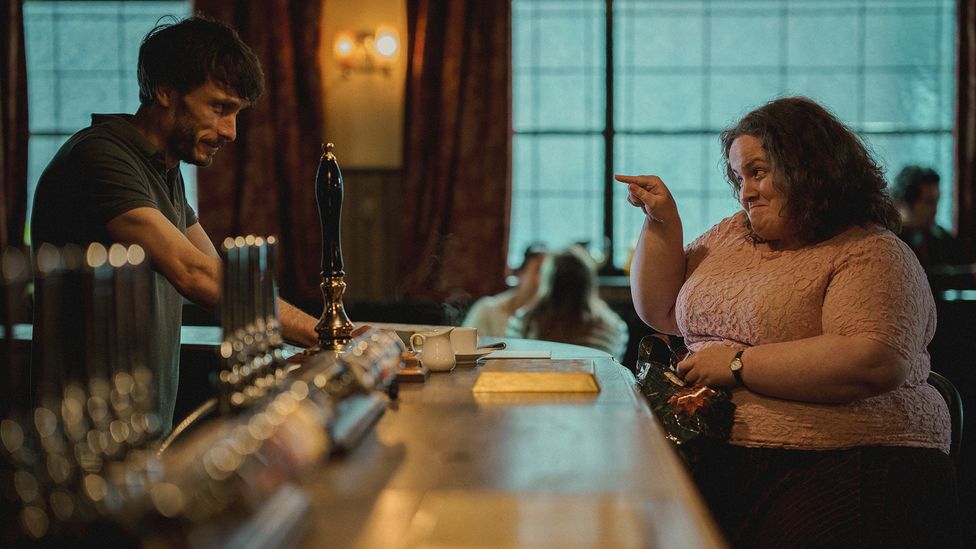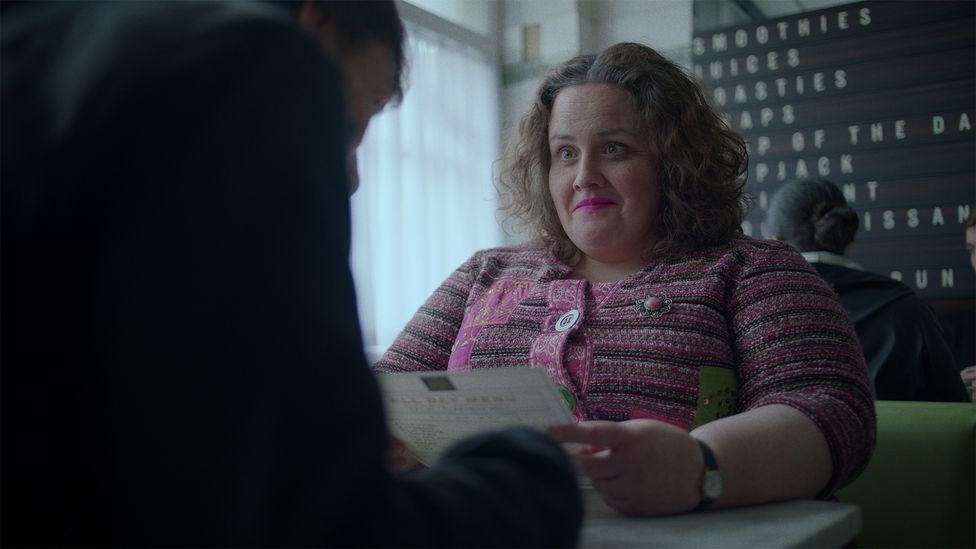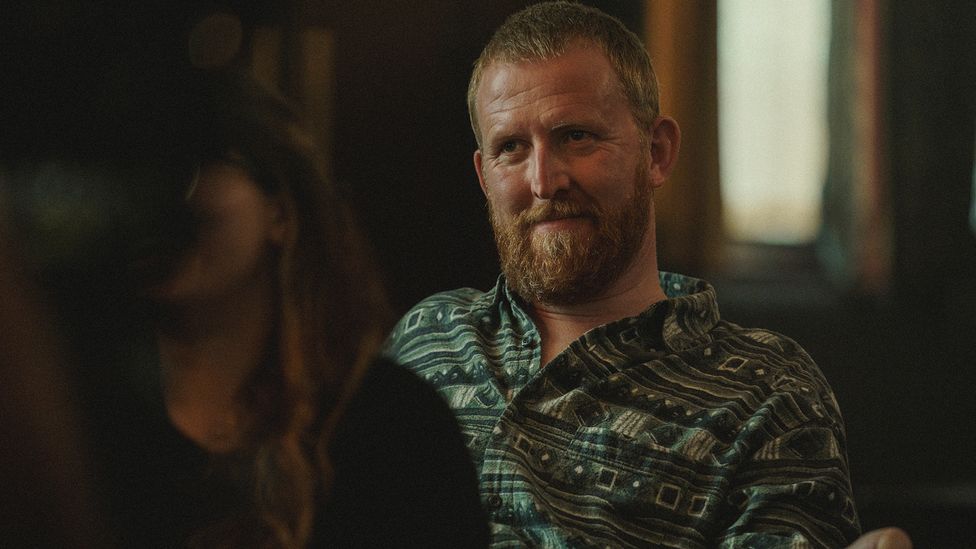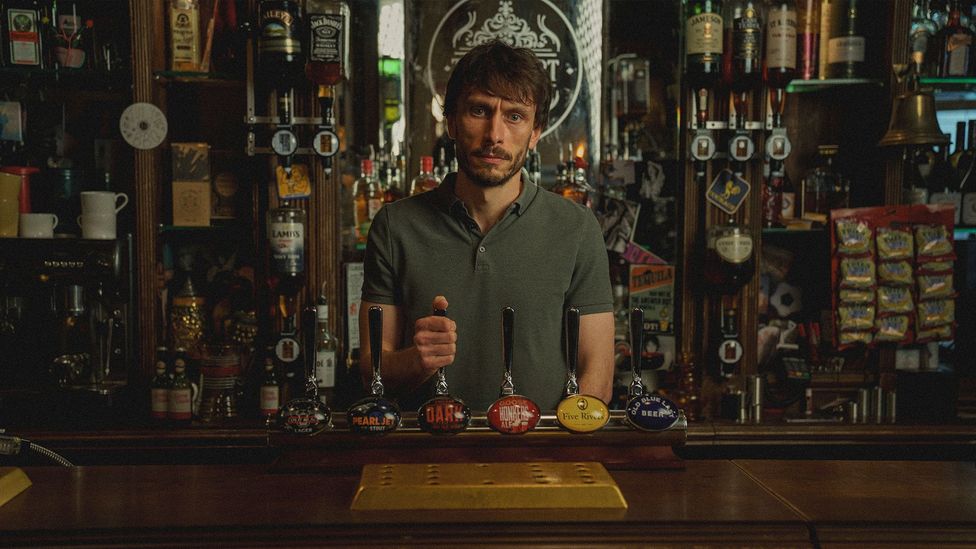When the trailer for new Netflix series Baby Reindeer dropped at the beginning of April, it looked like it would be your average dramedy; a blithe story of a comedian with an annoying stalker who emails him things like: “I jusst[sic] had an egg."
Warning: This article contains spoilers for Baby Reindeer throughout, as well as references to sexual assault
And therein lay the first masterstroke of Scottish comic Richard Gadd – the writer, producer and star of Baby Reindeer. With the audience subconsciously primed to expect one thing, when people actually saw the show, it winded them like a gut-punch.

Baby Reindeer begins with a lonely woman, Martha, meeting Gadd's character Donny in the pub where he bartends – so beginning her stalking of him (Credit: Netflix)
"Clicked on this last night, not knowing anything about it," one person commented under the trailer on YouTube. "It's brutal, unsettling and disturbing and probably one of the best shows Netflix has produced in a long time." Another person commented: "Same… Initially, I categorised it as a possible dark British comedy, relegating it to background noise… yet it emerged as a journey through a spectrum of emotions." After its release on 11 April, it quickly hit number one on Netflix's most-watched charts in the US and the UK with 10.4 million hours watched at the time of writing.
Given there wasn't very much publicity for the series beforehand, many viewers would have been coming to the story for the first time, not aware that the seven-part series is in fact autobiographical and based on true events in Gadd's life, which he first turned into a one-man comedy theatre show of the same name in 2019.
The real-life storyBack in 2015, a woman walked into the London pub where Gadd worked, and offering her a cup of tea, he struck up a conversation with her. For three years she then carried out a campaign of harassment against him, starting by turning up at his work incessantly, then at all his comedy gigs. She later got hold of his email, sending him more than 41,000 messages during this period, and once she got hold of his mobile phone number, she left him 350 hours of voicemail. She sent him unwanted gifts (calling him "baby reindeer" in reference to a cuddly toy from her childhood he reminded her of) and made false criminal claims against his family to the police. When Gadd went to the police about her, they initially failed to help, as he told The Guardian: "I was getting told off for harassing the police about being harassed."
Gadd has used his trauma here for the most remarkable of ends, creating four hours of heartbreaking television
Martha – as Gadd names the stalker in the show, and played by Jessica Gunning – is shown as a malevolent presence as she suffocates Gadd's existence digitally and in real life; turning up to abuse him while he’s on stage, viciously attacking his date Teri (Nava Mau) and sexually assaulting him as he walks home by the canal one night.
Yet Martha is never portrayed as a caricature "bunny boiler", but in a rather more nuanced way as a person who is clearly struggling with mental health issues. As Gadd told The Independent: "Stalking and harassment is a form of mental illness. It would have been wrong to paint her as a monster, because she's unwell, and the system's failed her". Donny – Gadd's fictionalised self in the show – shows compassion for Martha for this reason, but also seems to be intrigued and almost flattered by her interest at first – which begins to explain some of his bizarre initial interactions with her. He takes her out on a coffee date, follows her home, and appears to sometimes indulge her fantasy that they will one day be together. Gadd acknowledges that in reality, he made missteps: "I did loads of things wrong and made the situation worse," he told The Guardian. "I wasn’t a perfect person [back then], so there's no point saying I was."

Jessica Gunning is remarkable as Martha, inspiring both compassion and fear (Credit: Netflix)
However, in one of the most powerful and brutal moments of TV this year, episode four flashes back in time and reveals – with what is in effect an extended jump scare – the main reason for Donny's conflicted behaviour towards Martha: he is just as vulnerable a person as her, as he has previously been groomed and raped by a man he considered a friend. The leftfield turn halfway through the series takes viewers right to the source of Donny's psychological turmoil, and answers the question Martha perceptively asks him early on: "someone hurt you, didn’t they?".
More like this:
Why I May Destroy You is the future of TV
The films taking on abusive men
Nine of the best TV shows to watch this April
Set up as a self-deprecating side-story about Donny struggling as a comedian at the Edinburgh Fringe Festival, the episode builds with a creeping dread as we're introduced to Darrien (Tom Goodman-Hill), a TV industry writer who offers to help Donny make his way into the higher echelons of the comedy world; but who instead plies him with drugs. While Donny is passed out at his flat, Darrien sexually assaults him for the first time. In a further shocking scene, on another occasion, Darrien rapes him. Such is the power that Darrien wields over Donny in his coercive abuse, Donny feels he can't leave. "I would love to say I left," Donny says in the voiceover, "that I stormed out and never went back. But I stayed for days afterwards. On Monday I got an eye infection and lay on his floor and he bathed it in salt water. On Tuesday I fed his cat while he took phone calls."
The shame and disgust Donny feels then seeps outwards into all areas of his life, and the rest of the episode chronicles his vivid descent into sexual recklessness caused by PTSD, putting himself in danger multiple times in a bid to counteract his confusion and self-loathing. Once again, this story comes from Gadd's own life: in his 2016 theatre show Monkey See, Monkey Do, he detailed how a man he met at a party went on to rape him.
The brilliant show it recallsThe aftermath of sexual assault has rarely been shown so rawly and viscerally on television – in parts Baby Reindeer feels like a horror film – and Gadd is courageously open and honest about the devastating experience, and deft in translating the complexities of the situation for a TV audience. In some ways, Baby Reindeer is reminiscent of Michaela Coel's genre-defining 2020 series I May Destroy You, in which she also fictionalised her real-life rape at the hands of a stranger, and the terrible toll of that event psychologically on her. Both series offer a uniquely powerful perspective in having their writers cast themselves in a story based on their assault – in a way that Coel has referred to as "cathartic" and Gadd has described as "the best therapy for me, it's kind of been a lifesaver".
“Sharing traumatic experiences in a supportive environment can facilitate 'cognitive processing' of the event, which allows individuals to make sense of what happened and integrate it into their autobiographical memory," says psychologist and broadcaster Emma Kenny of this form of creative expression. "This process helps to reframe the trauma in a way that is less distressing and disruptive to one's sense of self and worldview. It can also serve as a form of 'externalisation', where victims receive empathy, validation, and support from others, reinforcing their sense of self-worth and reducing feelings of isolation and shame. This social support can buffer against the negative impact of trauma and promote resilience.”
In both shows, though, the characters' journey with their trauma finishes on an ambiguous note. While Coel's I May Destroy you alter-ego Arabella descends into a fantasy world in the final episode of the show, imagining the different ways she would react if she came face to face with her rapist, ultimately she never gets that opportunity. Donny does, however, visting Darrien towards the end of Baby Reindeer, presumably with the intention of confronting him about the rape. But just as Arabella fails to get the neat ending to her ordeal that she fantasises about, Donny too is denied his rapist's accountability, and the ability to tie up all the loose ends neatly for his own closure. Instead, Darrien pretends like nothing is wrong, gaslighting Donny and quickly reasserting his hold over him again.

Tom Goodman-Hill as Darrien, the TV writer who assaults and rapes Donny in the series' darkest episode (Credit: Netflix)
This "confrontation" is all too depressingly true to a world where many rapists escape justice. It also reflects the complex and insidious nature of the effects of abuse, where victims can be trauma bonded to their abuser. As Gadd told GQ: "Abuse leaves an imprint. Especially abuse like this where it's repeated with promises. There's a pattern where a lot of people who have been abused feel like they need their abusers… the deeply entrenched, negative, psychological effects of attachment you can sometimes have with your abuser."
There are other highly emotional moments in the series following the revelation of abuse. We see Donny breaking down on stage, a moment that becomes a viral video which ironically gives him all the fame and success he's been craving; and he tells his parents the truth about the assault (to which his dad responds by hinting at his own abuse at the hands of those in the Catholic Church). Martha, we learn, is sentenced to nine months in prison, though Gadd hasn't revealed exactly what happened to his stalker in real life, telling The Times, "It is resolved. I had mixed feelings about it – I didn't want to throw someone who was that level of mentally unwell in prison."
The final moment, which shows Donny coming full circle, with a bartender giving him a drink on the house, just like he did to Martha the first time he met her, has led some people to wildly speculate that Donny may now begin to start obsessively stalking the man working behind the bar, though this seems way off the mark, given how the story is rooted in Gadd's own. More likely, it's Gadd making a more oblique comment about the cycle of trauma, and what states vulnerable people can be pushed into when they have not been given support.
Certainly, Gadd has used his trauma here for the most remarkable of ends, creating four hours of heartbreaking television, in which he has broken down and raked over his awful life experiences in a way that is profoundly enlightening and moving for others. As Kenny says, the popularity of Baby Reindeer, like I May Destroy You before it, may send positive ripple effects out when it comes to others dealing with real-life harassment and assault. “Engaging in public discourse about trauma can contribute to 'collective healing' by raising awareness, challenging societal norms and beliefs surrounding trauma, and advocating for social change and support systems for survivors. This can empower individuals and communities to address the systemic factors that contribute to trauma and promote a culture of empathy, understanding, and healing.”
While often a highly difficult watch – at this point, it's deserving of the "most disturbing TV of 2024" claim – it’s ultimately a privilege to join Gadd as he attempts to make sense of who he is, through what must be the most extreme form of therapy imaginable.
--
If you liked this story, sign up for The Essential List newsletter – a handpicked selection of features, videos and can't-miss news delivered to your inbox every Friday.
If you would like to comment on this story or anything else you have seen on BBC Culture, head over to our Facebook page or message us on Twitter.
